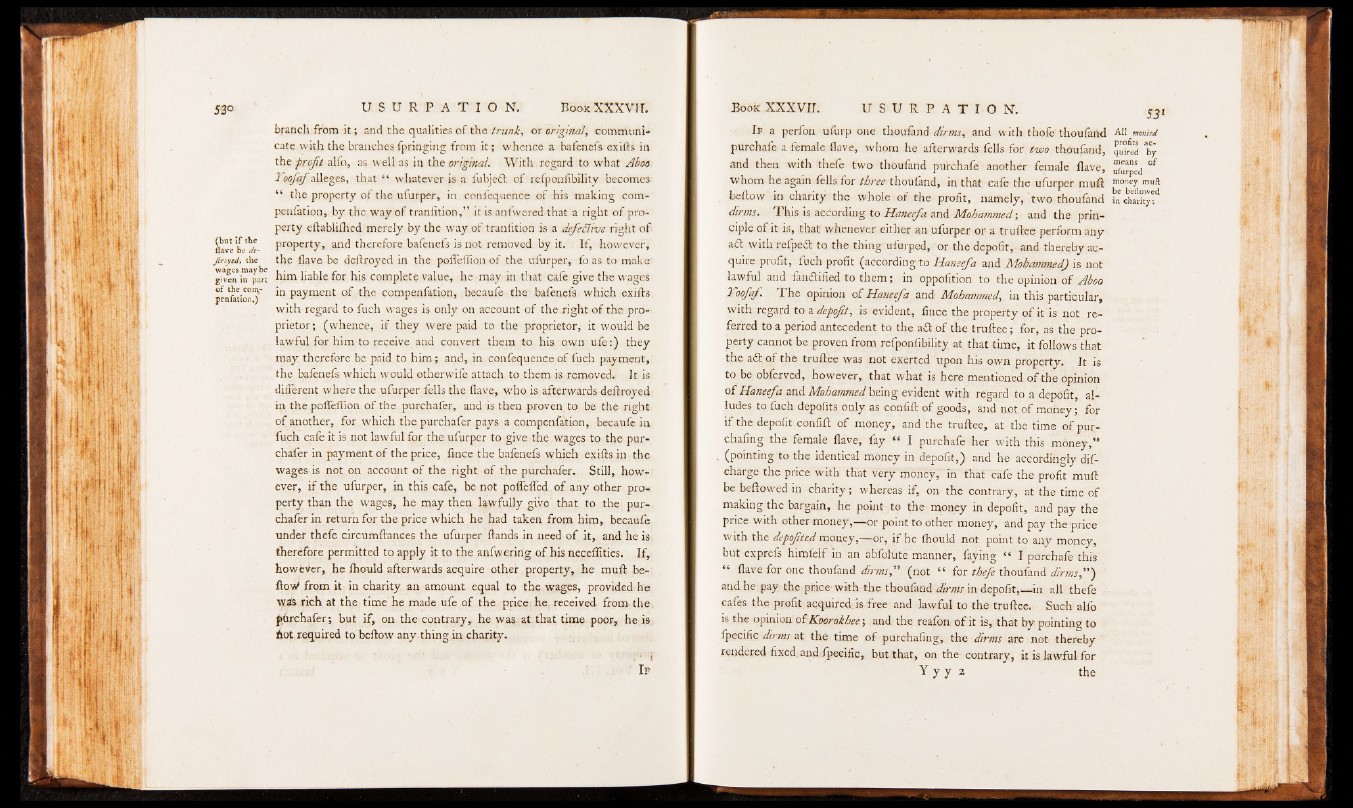
(but i f the
Have be de-
Jiroyed, the
wages may be
given in part
o f the cony
penfation.)
branch from i t ; and the qualities of the trunk, or original, communicate
with the branches fpringing from i t ; whence a hafenefs exifts in
the profit alfo, as well as in the original. With regard to what Aboo
Toofiafialleges, that “ whatever is a fubjedl of refponfibility becomes
“ the property of the ufurper, in confequence of his making com-
penlation, by the way of tranlition,” it is anfwered that a right o f property
eftablifhed merely by the way of tranlition is a defective right of
property, and therefore bafenefs is not removed by it. If, however,
the Have be destroyed in the pofleflion of the ufurper, lb as to make'
him liable for his complete value, he may in that cafe give the wages
in payment of the compenfation, becaufe the bafenefs which exifts
with regard to fuch wages is only on account of the .right of the proprietor;
(whence, if they were paid to the proprietor, it would be
lawful for him to receive and convert them to his own ufe:) they
may therefore be paid to him; and, in confequence of fuch payment,
the bafenefs which would other wife attach to them is removed. It is
different where the ufurper fells the Have, who is afterwards deftroyed
in the pofleflion of the purchafer, and is then proven to be the right
of another, for which the purchafer pays a compenfa'tion, becaufe in
fuch cafe it is not lawful for the ufurper to give the wages to the purchafer
in payment of the price, fince the bafenefs which exifts in the
wages is not on account of the right of the purchafer. Still, however,
i f the ufurper, in this cafe, be not poflefled of any other property
than the wages, he may then lawfully give that to the purchafer
in return for the price which he had taken from him, becaufe
under thefe circumftances the ufurper Hands in need of it, and he is
therefore permitted to apply it to the anfwering of his neceflities. If,
howfcVer, he Ihould afterwards acquire other property, he muft- be-
ftoW from it in charity an amount equal to the wages, provided he
was rich at the time he made ufe of the price he. received from the,
pfirchafer; but if, on the contrary, he was at that time poor, he is
hot required to bellow any thing in charity.
If a perfon ufurp one thoufand dir ms, and with thofe thoufand
purchafe a female Have, whom he afterwards fells for two thoufand,
and then with thefe two thoufand purchafe another female Have,
whom he again fells for three thoufand, in that cafe the ufurper muft
bellow in charity the whole of the profit, namely, two thoufand
dirms. This is according to Haneefa and Mohammed-, and the principle
of it is, that whenever either an ufurper or a truftee perform any
a£t with relpedt to the thing ufurped, or the depofit, and thereby acquire
profit, fuch profit (accordingto Haneefa and Mohammed) is not
lawful and fanctified to them ; in oppolition to the opinion of Aboo
Toofiafi. T h e opinion of Haneefa and Mohammed, in this .particular,
with regard to a depofit, is evident, fince the property of it is not referred
to a period antecedent to the a£t of the truftee ; for, as the property
cannot be proven from refponfibility at that time, it follows that
the a£t of the truftee was not exerted upon his own property. It is
to be obferved, however, that what is here mentioned of the opinion
o f Haneefa and Mohammed being evident with regard to a depofit, alludes
to fuch depofits only as confift of .goods,- and not of money;, for
if the depofit confift of money, and the truftee, at the time of pur-
chafing the female Have, fay “ I purchafe her with this money,”
(pointing to the identical money in depofit,) and he accordingly dif-
eharge the price with that very money,“ 'in that cafe the profit muft
be bellowed in charity; whereas if, on the contrary, at the time of
making the bargain, he point to the money in depofit, and pay the
price with other money,— or point to other money, and pay the price
with the depofited money,-—or, i f he Ihould not point to any money,
but exprefs himfelf in an abfolute manner, faying “ I purchafe this
“ Have for one thoufand dirms," (not “ for thefe thoufand dirms,")
and he pay the price-with the thouland dirms in depofit,— in all thefe
cafes the profit, acquired; is free and lawful to thé truftee. Such allb
is the opinion of Koorokhee ; and the reafon of it is, that by pointing to
fpecific dirms at the time of purchafing, the dirms are not thereby
rendered fixed and fpeeific, but that, on the contrary, it is lawful for
Y y y 2 the
A ll tnonied
profits acquired
by
means o f
ufurped
money muft
be bellowed
in charity: